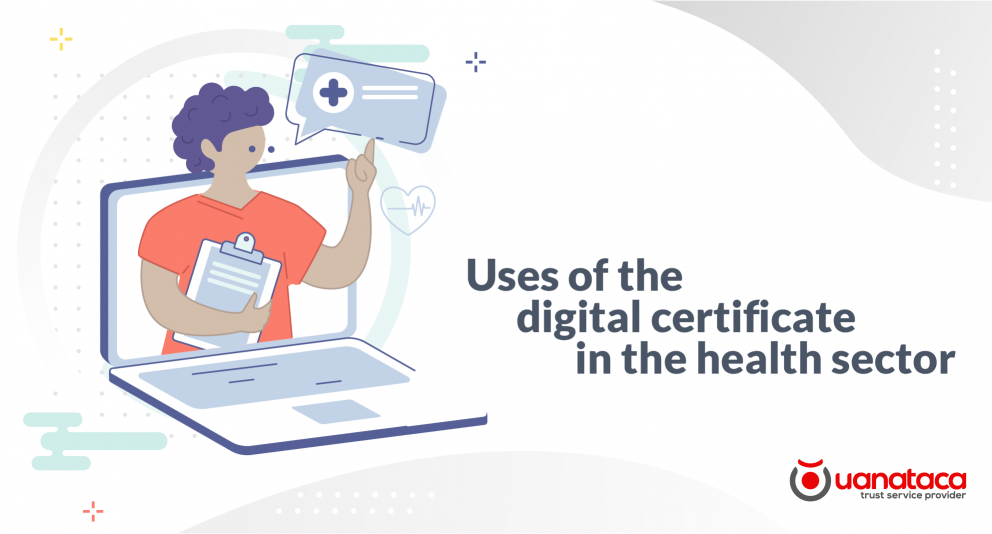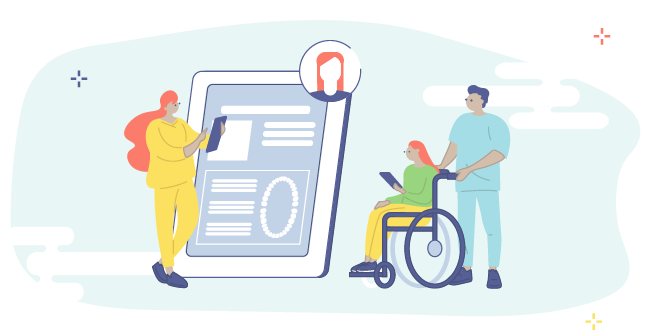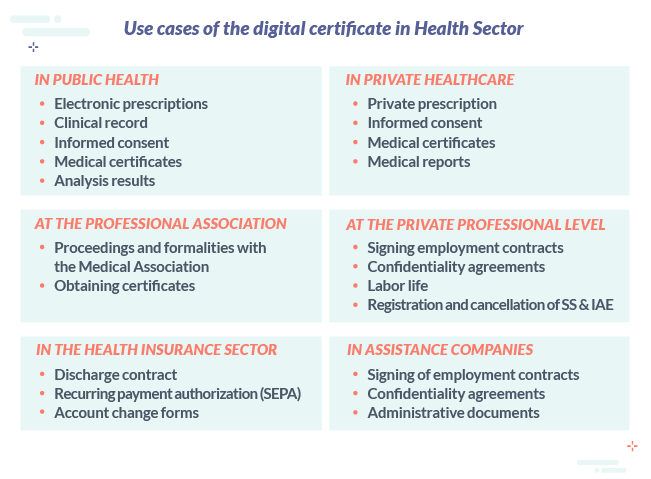
The entire healthcare ecosystem - from hospital groups, insurance companies and patients - is in the throes of digitalization. The COVID 19 healthcare pandemic has accelerated the pace at which changes are taking place and predictions for the sector augur a new model supported by technology.
In this post we discuss predictions for the future of the healthcare sector and how digital certificates support the transition to a more efficient, digital and personalized system.
Five predictions for the healthcare sector in 2025
It is a matter of time before, in most countries, the way of understanding health and the healthcare system changes substantially in the coming years. The Digital Health discipline, or in other words, the convergence of the digital and genomic revolution with all aspects related to health, will constitute a new healthcare model for the new society.
According to Deloitte, the renowned firm considered to be one of the so-called Big Four Auditors, these are the five predictions for the healthcare sector by 2025:
1. The home will be the usual place for routine health care/monitoring 🏠
2. Hospitals will be reserved for specialized treatment, trauma and emergencies 🏥
3. Many of the doctor-patient contacts will be made virtually and will be informed by evidence from the real environment 💻
4. More than 70% of users will perform a consultation by video connection 👩🏻💻
5. People will be better informed about their genetic profile, their current health and possible future diseases 📋
These predictions manifest that now is the time to invest in health, research, development and technology. Also to actively engage in the creation of a public policy geared towards the digital transformation required by healthcare systems.
In terms of digitalization, the global health crisis has revealed the serious shortcomings of the current healthcare system to adopt a Digital Health model: digitalization and the use of technologies are urgently needed to better combat the constant threats to public health.
In the transformation process, digital certificates are one of the most advantageous tools to facilitate the evolution towards a system that will reduce inefficiencies in healthcare delivery, improve access to diagnosis and treatment, reduce costs, increase quality and make medicine more personalized and accurate.
The digital certificate in the healthcare context
In the healthcare system, multiple services are developed with the aim of meeting the needs of prevention, diagnosis, treatment and recovery of patients. This generates a large number of documents that must be signed: registration documents, patient consent forms, discharge notices, privacy practices notices, among others. A truly endless list that, in some cases, must be kept for years (some up to 30).
With regard to the documents and information handled, secure and restricted access to medical data, efficient management and substantial savings in time and money are some of the challenges presented by traditional paper-based signature and archiving processes.

In this sense, the digital certificate is a tool that allows healthcare professionals and other non-healthcare personnel -directors, managers and administrative staff- to identify themselves and sign any document electronically.
Patients can also take advantage of the benefits of using this tool. One example is the signing of informed consent by means of an electronic signature based on a digital certificate, offering double protection to both the patient and the healthcare professional.
Of the two types of certificates recognized in the eIDAS Regulation, patients, non-healthcare personnel and physicians find in qualified digital certificates - issued exclusively by a QTSP - the assurance that their digital identity is properly guarded and cannot be altered. The aim is to establish maximum security parameters in any situation: their use guarantees strong authentication and maximum security guarantees and protection against document alteration.
In terms of assurance and security, centralized or cloud-based digital certificates - those generated and stored on the secure and monitored server (HSM) - prevent misuse and help simplify work. Collecting all certificates in a single point avoids risky situations, allowing the management and control of the use that users make of the certificate.

Thanks to centralization, access to an accessible digital identity is facilitated and can be used at any time and from anywhere: a consultation, from home or even at the pharmacy.

Advantages of using qualified digital certificates
QUALIFICATION AND SECURITY
It is possible to use qualified digital certificates with full security as they are issued by Uanataca, Qualified Trust Service Provider accredited by eIDAS. This figure, certified by the Ministry of Economic Affairs and Digital Transformation, reliably guarantees the identity of the natural or legal person to whom a qualified certificate is issued.
QUALIFIED ELECTRONIC SIGNATURE
Of the three types of electronic signature established by the eIDAS Regulation, the qualified electronic signature, which is equivalent to the handwritten signature, is the one that offers the highest level of security and, consequently, the maximum legal guarantees. To make this type of signature is needed, among other elements that ensure the highest level of security, a qualified digital certificate.
>> Related post: Simple, qualified or advanced electronic signature: how to differentiate them.
Using a qualified electronic signature solution that allows patients to sign documents remotely optimizes queues and unlocks healthcare capacity. Uanataca's One-Shot Signature is the only system that allows documents such as informed consent to be signed with a digital certificate issued at the time of signing.

SECURE ACCESS TO MEDICAL DATA
Digitally signed documents can be easily and securely shared between providers, allowing access to health information, after secure access, when needed.
Secure access to data in the healthcare system is vital. The qualified digital certificate is a strong authentication method that prevents data exposure to fraudulent use.
REGULATORY COMPLIANCE
The constant evolution of the legal framework governing the healthcare sector as well as the diversity of standards that make up the regulatory environment of this sector reinforces the need for control and management and reduction of the risks to which they are exposed.
eIDAS, HIPAA, ESIGN and UTEA are some of the legislations applicable to the healthcare sector that impact the way in which documents are stored, how signatures are obtained and how patient data is securely transmitted.
In this regard, qualified digital certificates and certificate-based electronic signatures meet the requirements of the listed and many other mandatory legislations.
📧 How can we help you? If you need advice on electronic signature and digital certificate issuance solutions adapted to the healthcare sector, please contact our team of professionals.